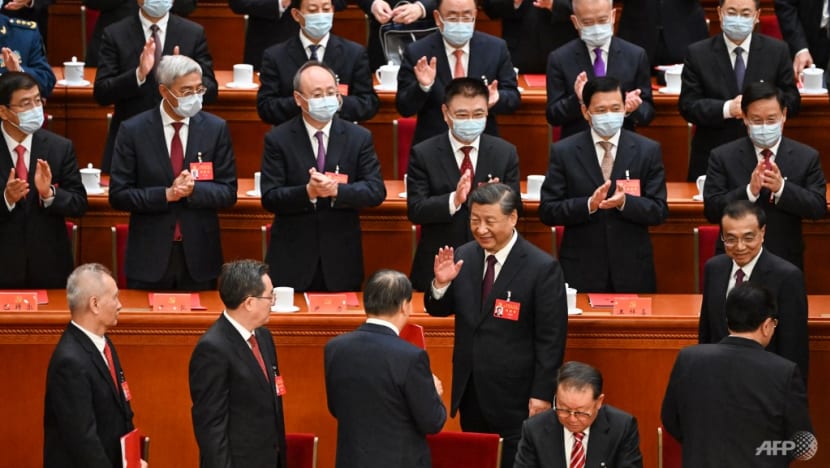From Xi's historic third term to leadership reshuffle: Key highlights from China's Communist Party congress
The Chinese Community Party also endorsed Xi Jinping's "core position" on the Central Committee and enshrined its opposition to Taiwan's independence in the constitution.

China's President Xi Jinping gestures during the closing ceremony of the 20th Chinese Communist Party's Congress on Oct 22, 2022. (Photo: AFP/Noel Celis)
Chinese President Xi Jinping secured a historic third term as China's leader on Sunday (Oct 23), shortly after the first meeting of the new Central Committee, which was elected on Saturday.
Xi walked at the head of the group at the presentation event for the Communist Party's seven-member Standing Committee, a position reserved for the party's general secretary.
The anointment of Xi came after a week-long congress which saw a sweeping reshuffle of the Central Committee, where a number of top officials - including Premier Li Keqiang - stepped down, as well as the endorsement of Xi's "core position" among the country's leadership.
CNA looks at the key highlights:
A HISTORIC THIRD TERM
Xi's reappointment as general secretary of the Chinese Communist Party for another five-year term effectively cements his position as the nation's most powerful leader since Mao Zedong, as it tilts the country decisively back towards one-man rule after decades of power-sharing among its elite.
Former leader Deng Xiaoping had written the presidential two-term limit into the constitution in 1982 to institutionalise succession but Xi abolished that limit in 2018.
The 69-year-old is now all but certain to sail through to a third term as China's president, due to be formally announced during the government's annual legislative sessions in March.
Since becoming the country's leader a decade ago, Xi has achieved a concentration of power like no modern Chinese ruler other than Mao.
He proposed the Belt and Road Initiative, pushed for China's rapid expansion in the South China Sea and hosted the 2022 Winter Olympics.
Xi also oversaw China's rise as the world's second-biggest economy, a huge military expansion and a far more aggressive global posture that has drawn strong opposition from the United States.
LEADERSHIP SHUFFLE
The Politburo Standing Committee of seven people, which included re-elected general secretary Xi, was revealed on Sunday.
The Standing Committee, which saw four new faces, represents the apex of political power in China.
The committee members were elected by the newly-minted Central Committee of around 200 senior party officials.
Former Shanghai party chief Li Qiang, a confidante of Xi's, was promoted to number two in the party hierarchy, making him likely to be named premier at the government's annual legislative sessions next March.
It would be an unusual appointment since Li, unlike most past premiers, does not have experience as a vice premier managing central government portfolios.
The 63-year-old rising star's prospects were seemingly in doubt after he bungled a harsh two-month lockdown of Shanghai earlier this year that saw residents left with a lack of access to food and medical care.
Related:
The third and fourth in the party hierarchy are Zhao Leji, the former head of the party's top anti-corruption watchdog and Wang Huning, the architect of Xi's "China Dream" slogan and the country's more assertive foreign policy. Both men are existing Standing Committee members.
Besides Li Qiang, the other newly promoted Standing Committee members are Cai Qi, Ding Xuexiang and Li Xi.
A new Central Committee of around 200 senior party officials was elected shortly before the closing ceremony on Saturday. The list of officials of the newly elected group revealed that four out of seven members of the Standing Committee would retire.
Among them were Premier Li Keqiang and Wang Yang - who was touted as a possible successor to Li. Wang and Li Keqiang, both 67, could still have continued in the Standing Committee for another five-year term.
Another two Standing Committee members - Han Zheng and Li Zhanshu, also stepped down. Han and Li Zhanshu were widely expected to step down, since they had surpassed the informal age limit of 68 for Politburo-level officials.
Other high-profile Communist Party top brass absent from the new Central Committee were high-ranking diplomat Yang Jiechi and economic tsar Liu He.
CONSTITUTION AMENDMENTS
China's Communist Party unanimously approved a series of amendments to its constitution on Saturday.
The party constitution, or charter, is a document of ultimate authority by which all 96 million party members must abide, and amendments remain effective indefinitely.
The party endorsed Xi's "core position" on the Central Committee as well as his rarefied status "in the party as a whole".
All party members will have to "acquire a deep understanding" of Xi's unassailable role and work to uphold it, the document said.
While the 69-year-old has long been referred to as the "core" of the party, the resolution uses the designation more often and in more reverent terms than the previous charter.
Analysts had closely watched for whether the party charter would be amended to enshrine "Xi Jinping Thought" as a guiding philosophy, a move that would put Xi on a par with Mao.
That did not take place, although a resolution did call the creed "the Marxism of contemporary China and of the 21st century", adding that it "embodies the best Chinese culture and ethos of this era".
In 2017, the lengthier "Xi Jinping Thought on Socialism with Chinese Characteristics for a New Era" was first woven into the charter, and argues that the party must take a commanding role in Chinese society while pushing further reform, national security and internal discipline.
OPPOSITION TO TAIWAN INDEPENDENCE
China's Communist Party also for the first time enshrined its opposition to Taiwanese independence in its constitution.
"(The Congress) agrees to include in the party constitution statements on ... resolutely opposing and deterring separatists seeking 'Taiwan independence'," the resolution said.
The previous charter said only that the party will "work continuously to strengthen the unity of all the Chinese people, including compatriots ... in Taiwan" as part of efforts to achieve the "reunification of the motherland".
In his opening address on Oct 16, Xi condemned "external forces" interfering in Taiwan, which China claims as its own.
Xi pledged a "major struggle" against separatism and interference in Taiwan, adding that "the Taiwan issue ... must be resolved by Chinese people alone".
"We ... will never commit to abandoning the use of force, and reserve the option to take all necessary measures," he added.
ZERO-COVID POLICY
China has repeatedly emphasised its commitment to its zero-COVID strategy.
Xi said in his opening address that the country had put "the people and their lives first" when dealing with the COVID-19 pandemic.
He said China had "protected people's safety and health to the highest degree and achieved significant positive results in coordinating epidemic prevention and control with social and economic development".
"We have adhered to the supremacy of the people and the supremacy of life, adhered to dynamic zero-COVID ... and achieved major positive results in the overall prevention and control of the epidemic, and economic and social development," Xi said.


















